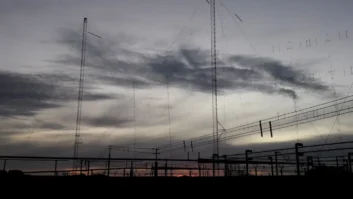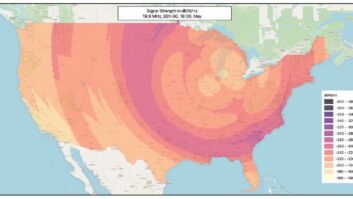A request by the Shortwave Modernization Coalition (SMC) for the FCC to amend its rules to allow fixed, long-distance, non-voice communications above 2 MHz and below 25 MHz has drawn a lot of interest, with 800 comments from observers being filed in the last 30 days. The proposal has drawn concerns from advocates for amateur radio.
However, the FCC decided not to extend the comment filing docket deadline, even after several groups requested it do so. Comments for RM-11953 were due July 31. Reply comments are welcome until Aug. 15. The proposal has drawn concerns from advocates for amateur radio.
The FCC’s Office of Managing Director in June asked for comments on the SMC proposal. It seeks to use multiple bands within the high frequency 2-25 MHz range for the transmission of time-sensitive data from fixed stations. The proposal would prohibit voice transmission and mobile operations. While the proposal excludes amateur bands, high power operations on immediately adjacent spectrum allocated to the Amateur Radio Service are being proposed.
The firms that make up the coalition are “market makers and liquidity providers” for exchanged-traded financial instruments. The high-frequency trading industry has been using the shortwave links for several years using experimental licenses granted by the FCC to send trading data between U.S. and foreign exchanges. The industry has often relied on fiber and other technologies for long-distance, passive market making, according to experts.
In the latest developments, Skywave Networks filed a motion in late July to extend the comment deadline beyond July 31 by 30 days to allow it additional time to “analyze spectrum availability and optimal usage as well as impact on the industry.” In addition, FlexRadio Systems filed a motion a few days later requesting more time to study “the experiments and model the proposed emissions and anti-interference mechanisms proposed” by SMC.
The FCC’s Wireless Telecommunications Bureau denied the motions, saying the commission’s rules make it clear that extensions of time are not routinely granted. It’s also “premature to anticipate the FCC will decide to proceed to initiate a Notice of Proposed Rulemaking (NPRM) to change Part 90 of its rules,” the bureau said in a release.
[Sign Up for Radio World’s SmartBrief Newsletter]
The bureau continued in its ruling: “We further note that commission proceedings involving technical rules, such as those pertaining to 2-25 MHz band use, can be expected to contain complex filings of a detailed nature, and the SMC petition is consistent with that expectation. We find nothing sufficiently unique or unusual that would warrant extension of time in this instance.”
Skywave Networks, a shortwave radio technology company, in subsequent comments told the FCC it sees tremendous potential in the productive use of shortwave for long-distance, specialized, data transfer and supports the commission’s efforts to open eligibility in the 2-25 MHz band. However, “the commission must carefully consider an appropriate regime for the licensing of the 2-25 MHz band, including smaller limits on bandwidth and greater protections for co- and adjacent spectrum users,” the company wrote.
SMC said in its petition the proposed amendments to high frequency spectrum would enhance the ability of users to quickly access “real-time financial data and continue to act in a manner to improve asset prices, to the benefit of centralized markets and market participants,” the coalition said in its petition.
The proposed amendments also have the potential to spur additional innovations in the use of 2-25 MHz Band frequencies, according to the coalition. The coalition includes DRW Holdings, IMC Trading Group, Virtu Financial Inc., NLN Holdings, Optiver Services and Tower Research Capital.
However, opponents say the proposed petition puts hundreds of thousands of licensed American amateur radio operators at risk of receiving interference in the adjacent amateur bands.
The National Association for Amateur Radio, also known as the American Radio Relay League (ARRL), is among the groups who voiced opposition to the petition for rulemaking: “Many of the subject Part 90 bands are immediately adjacent or very near to spectrum bands that are allocated to the Amateur Radio Service on a primary basis. These bands are very heavily used for worldwide communication by Amateur Radio licensees employing significantly less power than that proposed by SMC for purposes that include vital support during disaster recovery and mitigation, technical and scientific experiments, and propagation studies,” according to the group’s comments.
The FCC is currently accepting reply comments under proceeding RM-11953.











